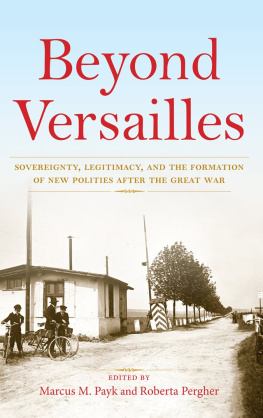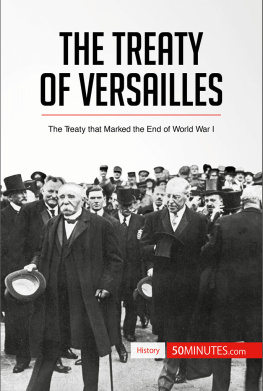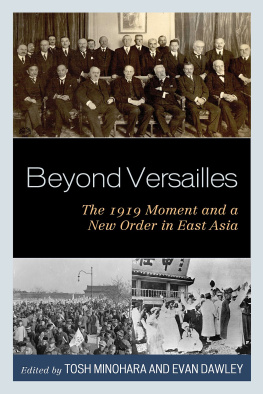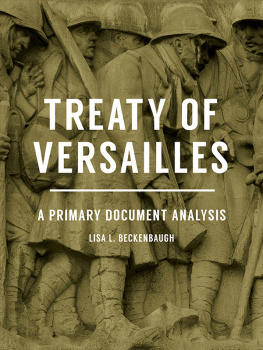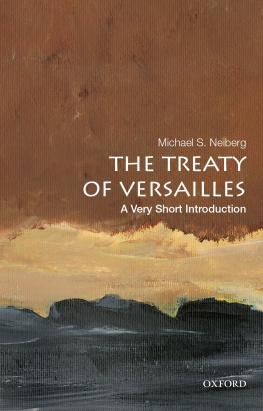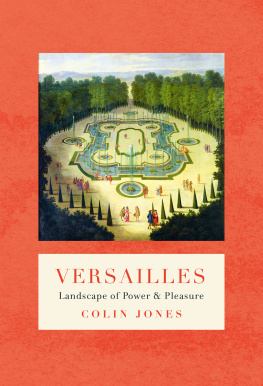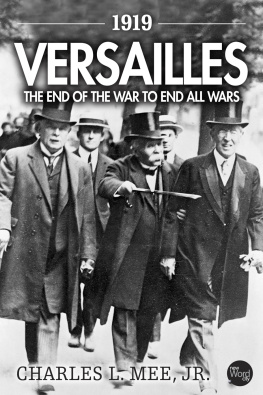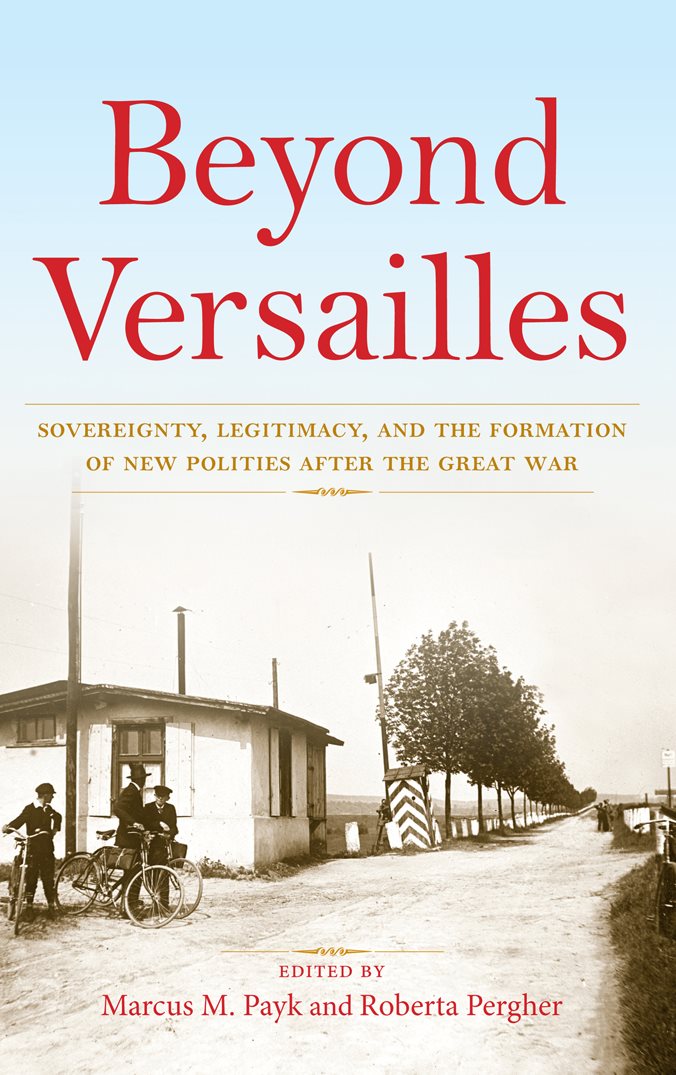Table of Contents
Guide
Beyond Versailles

Contents
Beyond Versailles
This book is a publication of
Indiana University Press
Office of Scholarly Publishing
Herman B Wells Library 350
1320 East 10th Street
Bloomington, Indiana 47405 USA
iupress.indiana.edu
2019 by Indiana University Press
All rights reserved
No part of this book may be reproduced or utilized in any form or by any means, electronic or mechanical, including photocopying and recording, or by any information storage and retrieval system, without permission in writing from the publisher. The paper used in this publication meets the minimum requirements of the American National Standard for Information SciencesPermanence of Paper for Printed Library Materials, ANSI Z39.48-1992.
Manufactured in the United States of America
Library of Congress Cataloging-in-Publication Data
Names: Payk, Marcus M., editor. | Pergher, Roberta., editor.
Title: Beyond Versailles : Sovereignty, Legitimacy, and the Formation of New Polities After the Great War / edited by Marcus M. Payk and Roberta Pergher.
Description: Bloomington, Indiana : Indiana University Press, 2018. | Includes bibliographical references and index.
Identifiers: LCCN 2018049712 (print) | LCCN 2018052054 (ebook) | ISBN 9780253040947 (e-book) | ISBN 9780253040909 (cl : alk. paper) | ISBN 9780253040916 (pbk. : alk. paper)
Subjects: LCSH: EuropePolitics and government1918-1945.
Classification: LCC D727 (ebook) | LCC D727 .B47 2018 (print) | DDC 940.5/1dc23
LC record available at https://lccn.loc.gov/2018049712
1 2 3 4 5 24 23 22 21 20 19
The idea for this project was born over coffee and cookies at the Institute for Advanced Study in Princeton in the spring of 2013, when the two editors were fellows at the institutes School for Historical Studies. Our plan for a conference exploring the emergence of a new world order beyond Versailles was realized in May 2015 at Humboldt University of Berlin. More than twenty scholars presented their work, offering new interpretations about the implementation and afterlife of the Paris peace settlements following the First World War. The lively and collegial discussions at the conference reverberate in these pages. We would like to thank all the participants, including those not represented in this volume.
The organization of the conference and the preparation of this book were made possible by the generous support of the Fritz Thyssen Foundation; a Mellon Innovating International Research, Teaching, and Collaboration Grant from Indiana University, Bloomington; and the Kosmos-Programm of the Humboldt-Universitt zu Berlin. Sophie Abramowicz, Karin Trieloff, and Timo Walz helped with all conference arrangements and the preparation of the book manuscript. Eva Schissler translated and provided editorial assistance. Theresa Quill, map librarian at Indiana University, created the map used for the frontispiece. We are grateful to the two anonymous reviewers for their helpful and constructive suggestions. Finally, we thank Jennika Baines and Kate Schramm at Indiana University Press for their unwavering support and their continuous guidance.
Marcus M. Payk (Hamburg)
Roberta Pergher (Bloomington, Indiana)
Commenting on the difficulty of enforcing the policies and principles formulated at the Paris Peace Conference, Chief of the British Imperial General Staff Henry Wilson complained in June 1919 to British premier David Lloyd George: The root of evil is that the Paris writ does not run. Wilson was right in many respects. Agreeing on what should go into the Paris peace treaties was only half the battle. The terms of the treaty had to be implemented and enforced, and the peacemakers reach was not limitlessto the contrary. War, insurrection, and civil strife continued to shake eastern Europe; the vanquished nations opposed the peace terms with increasing strength and defiance; unrest and discontent spread in the colonial world; the great powers felt deeply threatened by the Russian revolution and yet unsure how to respondand these were just a few of the challenges that bedeviled the statesmen assembled in Paris. Often enough the peacemakers themselves did not want to invest any further resources into faraway places. The public too soon grew impatient with what it perceived as drawn-out diplomatic parlor games and shaky compromises concocted in ornate and smoke-filled salons. Before long, the impression of an irreconcilable chasm between the lofty ideals of peacemaking and the grim realities of a chaotic and unresolvable postwar situation took hold in the popular mind.
Even so, the Paris writ ran further and deeper than Henry Wilson acknowledged. What politicians, experts, and administrators discussed and decided on in Paris mattered greatly. If ideas of national self-determination, minority rights, and colonial emancipation were older than the Great War, Paris imbued them with new energy, afforded them new legitimacy, and indeed made them seem the constituent principles of an emerging new world order. This book is about that Paris writ: about the partly codified, but partly unwritten principles and promises of a new normative international regime, principles and promises that resonated a long way from Parisfrom Polish borderlands to Portuguese colonies, from the city of Vienna to those of Cairo and Tehran. What did individuals and groups in places where the peace treaties were to be executed understand the new norms of sovereignty and legitimacy to mean? How, for instance, did people who voted in plebiscites make sense of the principle of national self-determination? As former imperial provinces became new nations, how did the new Paris norms affect notions of citizenship and belonging? How, in other words, was the Paris writ reinterpreted on the ground, across Europe and in the colonies?
The point is not simply to shift the spotlight from the metropole to the periphery. Rather, this volume explores the interplay between what was decided at the peace conference and what unfolded beyond, between allegedly universal principles and particular understandings in particular places. For whatever intentions guided the peace-makers, the settlement they produced was in turn interpreted and adapted locally and regionally, as well as nationally and internationally. New postwar tenets such as self-determination as an inherent right of peoples took on a life of their own, conflicting with more traditional doctrines of sovereignty or hitherto inviolable assumptions about the colonial right to rule. At times they gave rise to visions of the international order that were the very opposite of what the peacemakers had originally intended. This volume explores the complex force field of discourses and policies that emerged in the wake of the peace treaties.
The Paris Settlement in an Unsettled World
Seldom has the map of empires, nations, and peoples been so open to redrawing as during the deliberations of the Paris Peace Conference in 1919. Taken together, the Treaties of Versailles, Saint-Germain, Trianon, Neuilly, and Svres, not to mention several dozen related agreements and conventions, sealed the end of the German and Austrian Empires, redrew state borders across Europe and the Near East, and validated the emergence of new states from unruly Poland to stillborn Armenia. The settlement also established the self-determination of people as the core principle of legitimate government, created a new framework for the international order in the form of the League of Nations, and introduced new protections for peoples that were not self-governing nationsbe it in the mandate system as a progressive form of colonial rule or in minority rights enshrined in the treaties with the vanquished and their successor states.
Next page
